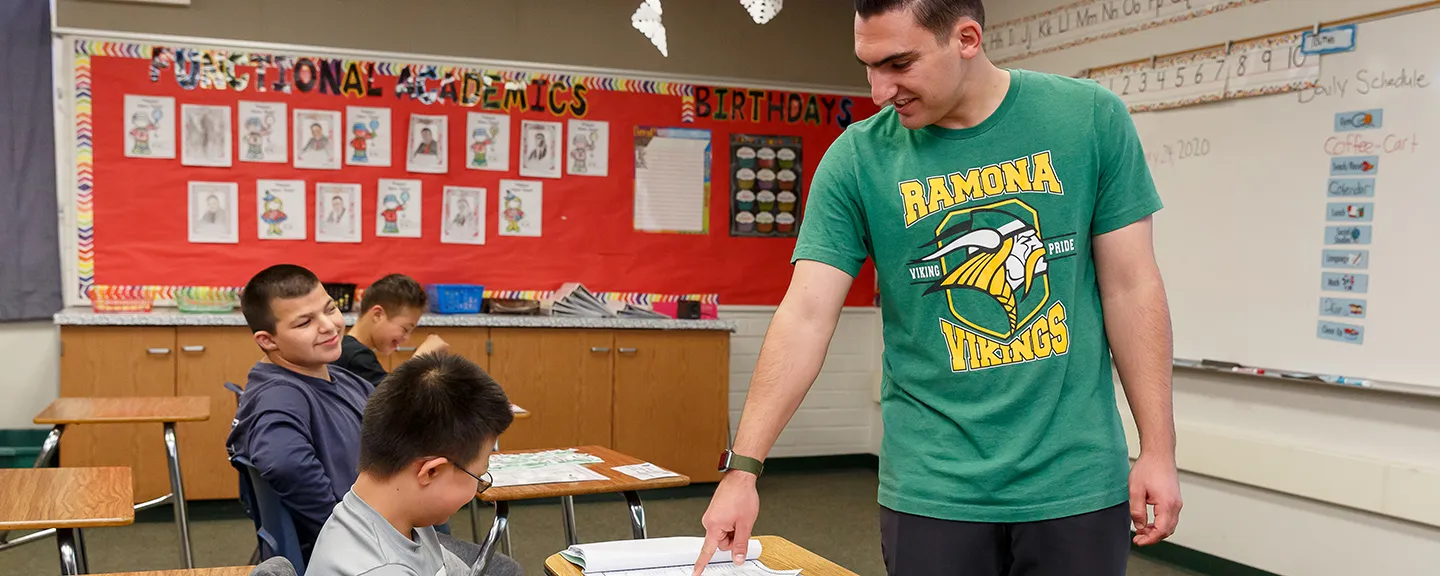
School Psychology, EdS, with embedded Educational Psychology, MAEd, and School Psychology Credential
Earn an EdS in School Psychology with Embedded MAEd: Educational Psychology and Pupil Personnel Services Credential in School Psychology at Azusa Pacific University
You’ll accelerate your career and graduate as a highly qualified candidate by simultaneously earning your EdS in School Psychology, MAEd in Educational Psychology, and the School Psychology Credential. Build your résumé and contacts in the field through on-site practicum experiences as a school psychologist—guiding students through challenging issues and empowering them to succeed. Further increase your marketability by choosing to pursue the requirements to serve as a Board Certified Behavior Analysts (BCBA) or Licensed Professional Clinical Counselor (LPCC).
APU Ranked Among Best Grad Schools by Money
Azusa Pacific University was ranked in Money’s Best Graduate School Programs 2025 for education and nursing, focusing on affordability, value, and return on investment.

Program at a Glance
Program Information
- Program Units: 66-89*
- Cost per Unit: $855
- Base Cost: $56,430-$76,095
Location
- Azusa (Main Campus), Orange County

Gain Hands-on Experience
- Efficiently earn nationally recognized, dual advanced degrees.
- Serve as a school psychologist at an on-site practicum.
- Gain experience working with students across cultural and socioeconomic backgrounds.
- Explore how the Christian faith informs your career.
By the Numbers
Get Started
Program Details
This program equips school psychology candidates with distinctive and marketable skills and competencies.While the state-required credential for school psychologists is sufficient to secure employment, those with accompanying master’s and post-master’s degrees enjoy an undeniable advantage. Recognizing this, APU has embedded all the requirements for the Educational Specialist degree in School Psychology and the Pupil Personnel Services Credential: School Psychology within the Master of Arts in Education: Educational Psychology program for those candidates seeking a convenient, efficient track toward their ultimate education goals. The dual degree and credential combination—along with the program’s nationally recognized NASP accreditation—significantly increases graduates’ marketability by equipping them with a comprehensive approach to addressing diverse student needs.
Browse the tabs below—if you have questions, visit the Student Services Center page, and we’ll make sure you get the info you need.
Informational Meetings
Prospective students may attend an informational meeting prior to submitting an application. Complete details regarding admission and specific program requirements, advising, and general information are discussed at information meetings. For details on upcoming dates, meeting locations, or registration, check the School of Education's information meeting calendar or call (626) 815-5376.
Admission Requirements—Domestic Applicants
The university graduate and program admission requirements below must be met before an application is considered complete.
- Graduate application for admission
- $45 nonrefundable application fee
- Official transcripts from all institutions leading to and awarding the applicant’s
bachelor’s degree from a regionally accredited institution and all postbaccalaureate
study
An official transcript is one that Azusa Pacific University receives unopened in an envelope sealed by the former institution and that bears the official seal of the college or university. A cumulative minimum 3.0 (on a 4.0 scale) grade-point average on the posted degree is required for regular admission status. Provisional admittance may be granted to individuals with a lower GPA if competency can be shown through multiple measures. - Two recommendations submitted by employers, supervisors, or professors who have current knowledge of the applicant’s academic ability and potential within the profession
- A five-page essay or autobiography describing personal and professional history
- Résumé (preferred) or statement of experience including the most relevant work and volunteer experience
- Proof of Certificate of Clearance (COC). Applicants for Summer or Fall Terms must have a COC valid through January 31. Applicants for the Spring Term must have a COC valid through June 30. View instructions on Obtaining a Certificate of Clearance (PDF). Applicants are encouraged to begin this step as soon as possible to allow time for the California Commission on Teacher Credentialing to process your information.
- Proof the Basic Skills Requirement has been satisfied
Send official transcripts to:
Office of Graduate and Professional AdmissionsAzusa Pacific University
PO Box 7000
Azusa, CA 91702-7000
[email protected]
Watch the Application Tutorial
What to Expect
After all admission materials have been received by the Student Services Center, the faculty or department chair reviews the applicant’s file. The applicant is notified in writing of the admission decision.
Admission Requirements—International Applicants
Azusa Pacific University is authorized under federal law by the U.S. Citizen and Immigration Services and the U.S. Department of State to enroll nonimmigrant, alien undergraduate and graduate students. APU issues and administers both the I-20 and DS 2019 (F-1 and J-1 status documents respectively).
To apply for a graduate program at APU, the following requirements must be fulfilled in addition to meeting the domestic applicant and program-specific admission requirements specified above.
International applicants must also:
- Demonstrate proficiency in English through a placement test with the Academic Success Center, or through a TOEFL/IELTS score that meets program-specific requirements. Refer to APU’s English proficiency requirements to learn more. Request that official test scores be sent to APU. All other forms of proof indicated in the English proficiency requirements must be submitted directly to International Services.
- Provide a Graduate Affidavit of Financial Support (PDF) and a bank statement from within the last six months proving financial ability to pay for education costs through personal, family, or sponsor resources.
- Submit a copy of a valid passport showing biographical data, including your name, country of citizenship, date of birth, and other legal information.
- Get foreign transcripts evaluated. International credentials (transcripts, certificates, diplomas, and degrees) must be evaluated by a foreign transcript evaluation agency. View our policy and a list of approved Foreign Transcript Evaluation Agencies.
Send official transcripts to:
Office of Graduate and Professional AdmissionsAzusa Pacific University
PO Box 7000
Azusa, CA 91702-7000
[email protected]
What to Expect
After all admission materials have been received by the Student Services Center, the faculty or department chair reviews the applicant’s file. The applicant is notified in writing of the admission decision.
Multiple financial aid options are available to make your Educational Psychology degree affordable.
Delivering high-quality graduate programs takes a comprehensive support system. Your investment in an advanced degree or program includes a network of services and personnel who partner with you in pursuit of higher education. Below is a breakdown of some common fees associated with School of Education programs.
School of Education Fees
| Cost | |
|---|---|
| EdD in Educational Leadership (per unit) | $1,200 |
| EdD in Educational Leadership dissertation continuation courses (per unit) | $570 |
| Education master’s degree, credential, authorization, and certificate programs (except School Counseling and School Psychology programs) (per unit) | $675 |
| School Counseling and LPCC programs (per unit) | $815 |
| School Psychology programs and BCBA Certificate (per unit) | $855 |
| Audit (per unit) | half-price tuition |
| School of Education assessment fee (Taskstream/Teacher Performance Assessment; flat fee equal to cost of .25–1 unit, depending on the program and course the fee is attached to) | no longer applicable |
| Intent to Commence and/or Graduate Fee | $100 |
View a complete list of university fees.
All stated financial information is subject to change. Contact the Student Services Center at (626) 815-2020 for more information.
Financial Aid
Several types of financial aid are available to graduate students. The resources range from federal loans and state grants to, for some graduate programs, fellowships and scholarships. For details about financial aid available for your program, please contact the Student Services Center at (626) 815-2020.
Military Benefits
Military members—and in some cases their spouses and dependents—qualify for financial assistance covering tuition, housing, and books. Azusa Pacific is a Yellow Ribbon University and Military Friendly School, so you can be confident that you’ll receive the benefits and flexibility you need to complete your education.
School of Education Scholarships
APU also provides information on numerous financial aid options for prospective School of Education students. Learn more about the aid opportunities available.
School of Education Alumni Tuition Discounts
APU’s School of Education offers an alumni tuition discount for Azusa Pacific alumni starting in a graduate program.
Students must be in good academic standing and maintain satisfactory academic progress with a minimum cumulative grade-point average (GPA) of 3.0. Students must be enrolled at least half-time. If qualifications are met, the discount may be renewed each term. APU will pay $500 per term (up to $2,000 over the course of the program). This discount cannot be combined with other institutional aid. Contact Student Financial Services for complete eligibility details.
Notes on Eligibility: The School of Education’s doctoral program (Ed.D. in Educational Leadership) and the Clear Administrative Services Credential (CASC) program are not eligible for the alumni tuition discount. APU doctoral alumni are also not eligible for the School of Education alumni discount. Additionally, the alumni discount cannot be combined with other institutional aid, such as School of Education scholarships. Students who are eligible for both may choose to receive either the alumni discount or an APU scholarship. Contact Student Financial Services for complete eligibility details.
Note: Award and eligibility are applicable for the 2022-23 academic year and apply to students admitted beginning fall 2020. The discount is subject to change.
To view specific requirements and coursework information, visit the current academic catalog:
How many units do I take each term?
Most candidates are working adults and do not take classes full time. Half-time students take at least five units every 16 weeks. Academic advising is highly recommended to determine a suitable course load.
How long is a term?
A term is 16 weeks, including final exams.
How many hours does each class session require?
Classes meet for approximately 4 hours and 15 minutes, once a week.
How many evenings per week do I attend classes?
Most classes meet once per week either in the evening or on a Saturday.
How many students will there be in my classes?
APU is noted for its small classes with personalized attention. Most courses do not exceed 20 students.
Does APU require theses, dissertations, or capstone projects?
The program requires each student to take a comprehensive exam and to write a final growth assessment paper.
How soon can I finish this program?
Depending upon the desired course load, working individuals can finish Educational Psychology degree in three years.
Pathway 1: Educational Specialist Degree with Master’s and Credential
With this pathway, you’ll earn the educational specialist degree, master’s degree, and credential in school psychology. Accreditation by the National Association of School Psychologists (NASP) allows you to become a Nationally Certified School Psychologists (NCSP) upon graduating and passing the Praxis II School Psychology Examination.
The program is ideal for those who want to work in educational settings. All coursework is taught from a Christian perspective by expert faculty-practitioners.
APU graduates are distinguished from their counterparts by their caring, compassionate approach, strong background, and high ethical standards. With solid preparation in this area, you will be able to effectively assess and improve outcomes for students of all cultures, social levels, and learning abilities.
Read more about careers for school psychologists.
Pathway 2: Add an Applied Behavior Analysis (ABA) Specialization
With this pathway, you’ll earn not only the educational specialist degree, master’s degree, and credential, but also add specialized coursework in Applied Behavior Analysis (ABA). Completing your degrees with an ABA specialization gives you extended knowledge needed to provide intensive behavioral treatment and intervention services for students diagnosed with autism and related disabilities.
With an extra 23 units in Applied Behavior Analysis, the specialization is approved by the Behavior Analyst Certification Board (BACB) and meets the educational requirements for eligibility as a Board Certified Behavior Analyst (BCBA). Additional requirements to achieve certification include successful completion of supervised clinical experience, as well as the certification exam administered by the BACB.
Faculty who teach ABA coursework are fully licensed and experienced BCBA professionals. This specialization also has the distinction of dual accreditation by both the BACB and NASP.
Read more about additional careers with an ABA specialization in the Career Outcomes tab.
Pathway 3: Add a Clinical and Educationally Related Mental Health Counseling Specialization
With this pathway, you’ll add a specialization in Clinical and Educationally Related Mental Health Counseling to your degrees and credential. Choosing this degree path enables you to acquire advanced skills to effectively meet the needs of students with emotional and behavioral challenges. You’ll also meet the educational requirements for a Licensed Professional Clinical Counselor (LPCC).
Graduates are equipped to provide Educationally Related Mental Health Services (ERMHS) or Designated Instructional Services (DIS). Through supervised field experiences and classroom curriculum, you’ll gain exposure to group and individual clinical counseling, addictions or substance abuse counseling and intervention, psychobiology/psychopharmacology, DSM-V diagnosis, and case conceptualization and treatment for school-based mental health services.
Faculty who teach in the sequence of five courses (15 units) are fully licensed and experienced MFT and LCSW professionals.
Read more about additional careers with an ERMHS specialization in the Career Outcomes tab.
With a solid understanding of the issues and pressures facing pupils today, candidates with this embedded dual Educational Psychology degree and credential are well equipped to serve as school psychologists in public school settings and communicate with pupils of all cultures, socioeconomic levels, and learning abilities.
According to the Bureau of Labor Statistics, employment opportunities for school psychologists are also expanding, with growth projected at 22 percent—faster than the average for all occupations—through the year 2020. Graduates gain preparation to serve as highly qualified psychologists in the following professional capacities:
- Public and private schools
- Colleges and universities
- School-based health and mental health centers
- Community-based day treatment programs or residential hospitals
- Juvenile justice centers
- Private practice—School psychologists with three years of experience working within a public school can become Licensed Educational Psychologists by taking the LEP exam.
- Applied behavior analysis clinics—School psychologists may work with specialized populations as consultants and interventionists for behavior change.
Graduates are also equipped for:
- Further studies at the doctoral level
- Pursuing coursework to become a Board Certified Behavioral Analyst (BCBA)
Additional Career Paths with Specialization in Applied Behavior Analysis (ABA)
Graduates with an added specialty in ABA are equipped to provide vital services for the growing population of children and adolescents diagnosed with autism and related disabilities. At Azusa Pacific, candidates gain academic and practical experience to administer Christ-centered, compassionate behavioral interventions and supports for youth and their families.
School psychologists and educational professionals with specialized skills in this area are increasingly in demand. While ABA is the preferred method of treatment in public schools, many school psychologists lack this advanced and highly specialized training, making BCBAs highly desirable to school districts.
Graduates find career opportunities as behavior consultants and behavior specialists in these additional settings:
- Behavior management providers
- Clinical services providers
- Hospitals
- Regional Campuses (California Department of Developmental Services)
Additional Career Paths with Specialization in Clinical and Educationally Related Mental Health Counseling
An added specialty in ERMHS counseling allows candidates to provide designated support services for students with emotional or behavioral disorders.
APU graduates not only gain advanced knowledge and skills to assist these student populations, but they also build a strong foundation of ethics and compassion that drives their commitment to serve others. School psychologists with such character traits are highly sought-after by districts and schools.
Graduates find additional career opportunities within the school system providing necessary mental health services to students with more intensive needs.
If you have questions, we’re here to help! Connect with a representative who can walk you through the program details and application process.
Contat Your Admissions Representative
Additional Program Contacts
- School Counseling email - [email protected]
- School Psychology email - [email protected]
- Michael Salce, EdD, Department of School Counseling and School Psychology Department Chair, [email protected], (626) 815-5130
Department of School Counseling and School Psychology
Phone
(626) 815-5424
Azusa Pacific University
PO Box 7000
Azusa, CA 91702-7000
Student Services Center
Contact (626) 812-3016 or [email protected], and visit apu.edu/ssc for details on the admissions process, financial aid, and class registration.
International Services
International students should contact +1-626-812-3055 or [email protected], and visit apu.edu/international/.
- Azusa Pacific University is accredited by the WASC Senior College and University Commission (WSCUC).
- In addition, the School of Education receives accreditation from the Council for the Accreditation of Educator Preparation (CAEP), making APU one of only three private schools in California with this distinction.
- Further, our credential programs are accredited by California’s Commission on Teacher Credentialing (CTC).
- Our Educational Psychology program is also accredited by the National Association of School Psychologists (NASP).
Career Outlooks and Outcomes
Featured Faculty

Michael Salce
Chair and Assistant Professor, Department of School Counseling and School Psychology

Julia ‘Judy’ Johnson
Assistant Professor; Program Coordinator, Licensed Professional Clinical Counselor (LPCC) Program, Department of School Counseling and School Psychology

David R. Morrison
Professor, School Counseling and School Psychology

The Golden State Teacher Grant: An Overview and APU’s Connection
APU is proud to be a recipient of the Golden State Teacher Grant, helping prospective California teachers to fund their education in pursuit of a teaching credential.